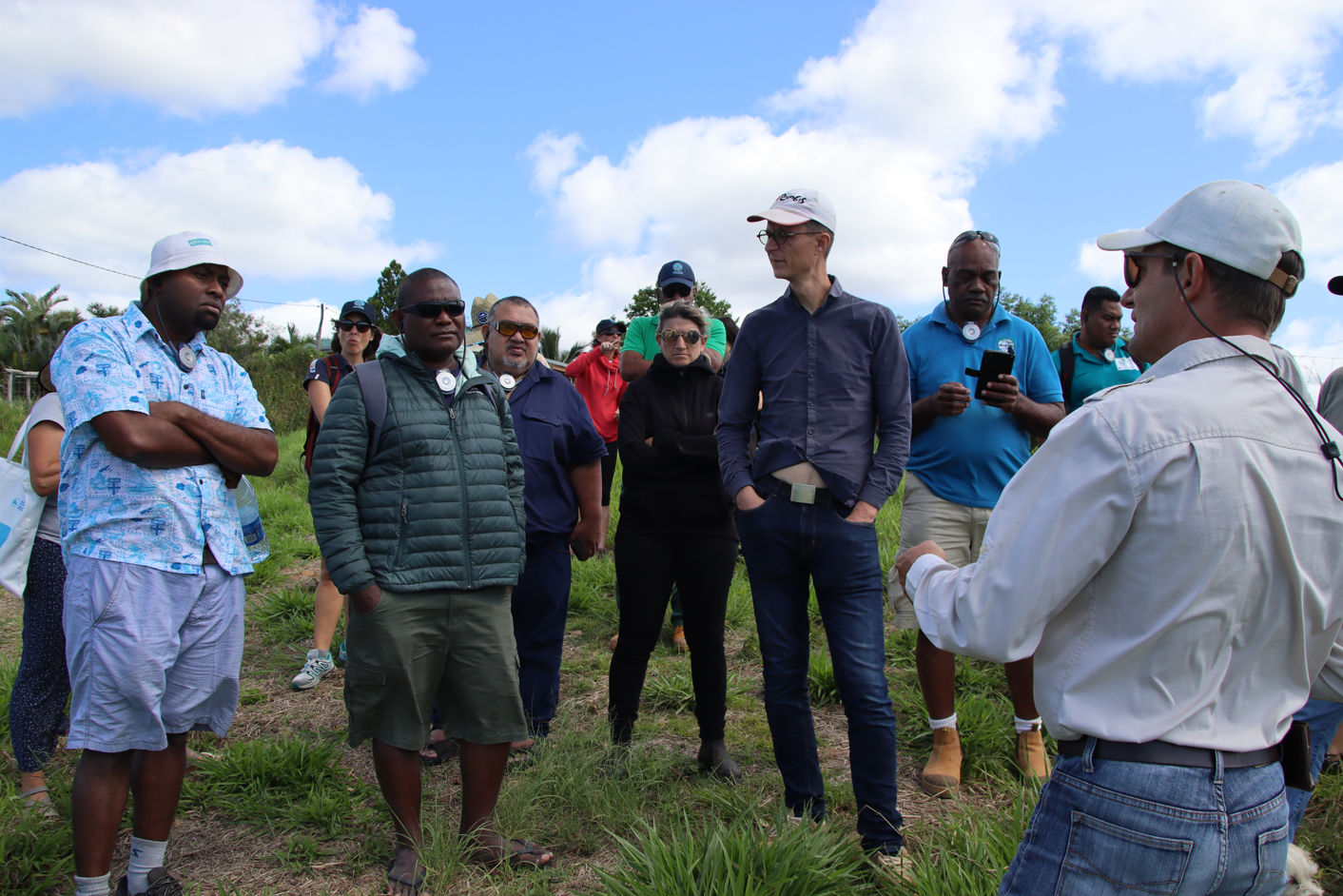Nature-based solutions are actions that protect, sustainably manage, or restore natural ecosystems, in directly addressing issues such as climate change and simultaneously providing human well-being and biodiversity benefits. For instance, a common problem is flooding in coastal areas that occurs as a result of storm surges and coastal erosion. This challenge, whilst traditionally tackled with manmade (grey) infrastructure such as sea walls, coastal flooding, can also be addressed by actions that take advantage of ecosystem services such as tree planting.
In October this year, representatives from Fiji, Nauru, Tonga and Solomon Islands that are members of the Pacific Organic Learning Farms Network (POLFN) had shared experiences with their Pacific French speaking counterparts in an exchange that covered best practices in the field for increasing organic farm yield and boosting livelihoods.
The POLFN team engaged with farmers and producers at the recent Tech & Bio Tradeshow in New Caledonia, a four-day exchange in early October that was part of the Pacific Community’s PROTÉGÉ programme that aims to activate a network of demonstration farms with farmers from New Caledonia, French Polynesia and Wallis and Futuna.

“We had the opportunity to get into the field as close as possible to local farmers to discover the effective methods they have put in place,” said Timoci Nakalevu, POLFN Project Manager at the SPC Land Resources Division’s POETCom.
He further shared that:
“We found that through methods such as rotation farmers can use natural fertilizer from chicken manure to grow vegetables. This method can generate three incomes through the sale of chickens, chicken manure and vegetables.”
Protege Learning Farms Network Member – Naqeleca

The POLFN team briefly visited Burai Province, where they met Mr Semi Naqeleca, a retired Fijian man farming organic produce in New Caledonia.
“We have to go back to the original way our ancestors farmed the land” – Semi Naqeleca, an indigenous from Serua in Fiji had been working in New Caledonia for the past 30 years and successfully running a commercial organic farm of vegetables since 2016. Participating in the Protégé Learning Farms Network, Naqeleca says he’s been able to receive support for the past couple of years in having his organic produce sold at local shops in the town of Burai. The Pacific Organic Learning Farms Network met Mr Semi Naqeleca at the Protégé network learning event in New Caledonia last week
Naqeleca found his motivation to move into organic farming after examining the evidential health benefits of organic produce, and at age sixty-nine his strength amongst his peers is testimony to the health benefits of organic food. He says communities have an obligation of faith to steward well what God has given through nature, as the soil is nutritionally packed to sustain communities and ensures longevity. Though his organic journey has been rewarding, the challenges such as price negotiation, quality seed saving and climate change and numerous trial and error has meant Naqeleca has had to adjust his farming methods to better adapt to the economy, the soil and adverse weather challenges.
POETCom sits down with New Caledonia Chamber of Agriculture
POETCom Board Chair Ms Sashi Kiran and POETCom Coordinator Mr Jim Pierce were able to sit down with the Presidents of the Chamber of Agriculture of New Caledonia and France during the exchange to discuss possible partnerships in how both France and Fiji can learn from one another in organic farming methods and technologies.
The exchange also included POETCom participation as presenters and exhibitors alongside the Pacific Community at the Tech and Bio exhibition, an international meeting of agricultural professionals that promoted new techniques of organic and alternative production and that was attended by organic and conventional farmers, teachers, students, researchers and agriculture advisors.

The POLFN regional project is funded by the Kiwa Initiative and implemented by POETCom. The Kiwa Initiative aims to develop organic farming systems as nature-based solutions for food security, climate change adaptation and biodiversity conservation in order to build the resilience of smallholder farmers in Fiji, Nauru, Tonga and the Solomon Islands.
For more information about the Kiwa POLFN project see: https://kiwainitiative.org/en/projects/an-organic-learning-farm-network-to-build-the-climate-resilience-of-smallholder-producers-in-the-pacific